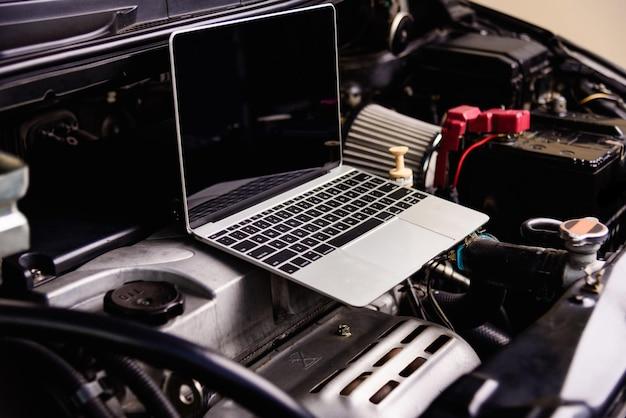How Many Sensors Are in a Car?
How Many Sensors Are in a Car?

Image source Freepik
We can't deny the fact that modern cars are more complex than the old models. One of their key features is the presence of electronics. Numerous electronic components and devices characterize these cars. Sensors are among the most notable electronic components in cars.
As the name suggests, sensors are designed to sense. They monitor various aspects of a vehicle and then relay that data to the vehicle's ECU (Electronic Control Unit). There are many types of sensors in a vehicle and each is designed to perform a specific role. So, how many sensors are in a car
In this article, we are going to discuss all the sensors that are in a vehicle. You will learn the role of each sensor and how it works in a car.
Different types of sensors in cars
Here are the different types of car sensors that you should know:
· Air-flow sensor: This type of car sensor is designed to measure the volume and density of air entering the combustion chamber. It is located inside the combustion chamber. It ensures that the right amount of air mixes with the fuel for optimum performance.
· Engine speed sensor: The main function of this sensor is to monitor the seed and position of the crankshaft. It is fitted right on the crankshaft from where can execute this task. It relays information about the crankshaft position to the ECU.
· Engine knock sensor: This car sensor is designed to monitor the engine knocks. It ensures the air and fuel mix correctly to ignite the vehicle’s engine. It monitors a car’s ignition process.
· Camshaft position sensor: The function of this car sensor is to monitor the exact position of the camshaft. By doing so, it controls the inlet and exhaust valves of a car’s engine.
· Throttle position sensor: This is for motoring the position of a car’s throttle valve. It does this every time that a driver presses on the accelerator pedal.
· Voltage sensor: This car sensor monitors and manages the idle speed of a car.
· Manifold Absolute Pressure (MAP) sensor: The MA sensor is designed to monitor the difference between the manifold and the external pressure.
· Speed sensor: measured the speed of the rotating wheel
· Temperature sensor: Monitors the temperature of the engine
· Oxygen sensor: Measures and monitors the volume of oxygen in the exhaust gases
· Parking sensor: Recognizes the presence of physical obstacles to guarantee safe and smooth parking of the vehicle.
These are just among the many other sensors that you will find in a car. There are many other car sensors that you will find in a car.
Number of sensors in a car
So, how many sensors are in a car? From this article, it is impossible to state the exact number of sensors in a car and this is due to various reasons. The main reason is not all cars are the same. Different cars have different numbers of sensors.
Some cars have more sensors than others. For instance, cars with complex features and functionalities have more sensors than cars with basic functionalities. The biggest question that you should ask is, what features are in the car? This will give you some clues about the number of sensors in a car.
In case you are working on an automotive project, let's say you are building a car or repairing one, listing down the features and functionalities that will be on the vehicle will also help you estimate the number of sensors that will be on that vehicle.
Alternatively, you can use other similar cars for reference to find out the number of sensors in cars. Get detailed information about their feature and specifications. You will eventually get the exact number of sensors in the vehicle.
Do all cars have sensors?
Yes. Technically, all modern cars have sensors. The only difference is the number and types of sensors that they have. As we have stated, some cars have more sensors than others.
Equipped with this information, you should handle each electronic component of the car with utmost care so as not to tamper with the functioning of the sensor.
What happens when a car sensor is not working correctly?
Since sensors are data collection devices, failure to work properly means that there will be errors in data collection. The data or information that a sensor will collect will not be accurate.
Wrong information will be relayed to the ECU and this will trigger a wrong response in the vehicle.
Let’s say the sensor in this case is an oxygen sensor. If it is not in perfect working condition, it will not relay accurate information about the state of the air and fuel mixture. This will in turn affect various aspects of a vehicle. You will experience poor fuel efficiency.
What should I do with a bad car sensor? Replacement is always the best solution. Given that sensors are made of sensitive electronic components, repair is rarely the best solution. It is always advisable to replace it with a completely new sensor. The replacement should be fully compatible with the car.
Additionally, you should buy the sensors from reputable sources. These can be authorized suppliers since they are approved by car manufacturers to distribute their sensors.
Final words
I hope that this article has given you a clear picture of the number of sensors in a car. Each sensor plays an important role in a vehicle. However, all of them work together for the smooth running of the vehicle. Whether it is a small saloon car, SUV, or large commercial truck, all of them heavily rely on sensors.
If you are keen on anything that is related to automotive electronics, you should have full information about all the sensors in a car. This knowledge will help you make the right purchase when it comes to buying sensors for cars.
When it comes to buying sensors for cars, ensure that you get them from the right sources. This is where ICRFQ comes in. We are a reputable car sensor supplier in China. We stock all types of sensors for different cars. As a reputable company, we are fully committed to ensuring that you get the right sensor for your cars. Send us details of the exact car sensor that you want and we will fulfill your orders.
Kevin Chen
Founder / Writer at Rantle East Electronic Trading Co.,Limited
I am Kevin Chen, I graduated from University of Electronic Science and Technology of China in 2000. I am an electrical and electronic engineer with 23 years of experience, in charge of writting content for ICRFQ. I am willing use my experiences to create reliable and necessary electronic information to help our readers. We welcome readers to engage with us on various topics related to electronics such as IC chips, Diode, Transistor, Module, Relay, opticalcoupler, Connectors etc. Please feel free to share your thoughts and questions on these subjects with us. We look forward to hearing from you!







 Start With
Start With Include With
Include With


